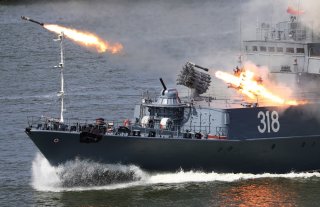The U.S. Army Is Prepared to Counter Russia's Plan to Destroy It
The Russian New Generation Warfare Handbook, based on observation of Russian tactics in Ukraine and to a lesser extent Syria, as well as published doctrine and public statements, hints at what this strategy may be.
Russian EW units may transmit misleading data to lure enemy forces into a trap, and signal-intercept devices and electromagnetic sensors can also detect the position of opposing communication and sensor nodes and subsequently direct precise artillery fires to destroy them.
These are not hypothetical capabilities; they have been demonstrated in the war in Ukraine. Russian electronic-warfare units shut down communications to frontline Ukrainian positions and directed deadly attacks on their headquarter units.
Western reliance on lavish C3 capabilities could be fatal in such an environment. Field commanders used to wielding precise control over their troops will instead need to learn to communicate in short transmissions, erect smaller and more dispersed Tactical Operation Centers, and give adaptable mission orders that delegate authority to low-level unit leaders to adapt to varying contingencies.
However, a major limitation to both Russia’s electronic-warfare and area-denial systems is that Moscow simply can’t afford enough of them, and is forced to shuffle these assets from one critical zone to another.
Because their deployment may be necessary for local units to achieve their mission, this can slow down the pace of operations and makes the location of the next local offensive more predictable. Disabling such system is thus more likely to cripple a military operation than simply inflicting personnel losses, which can be more easily replaced due to the conscription system.
It’s just as important not to overestimate an opponent’s strength as to underestimate them; likewise, while caution and situational awareness may be warranted, paranoia is not. The AWG’s handbook does its best to contextualize how New Generation warfare just as much an attempt to compensate for Russian weaknesses as to exploit gaps in adversary capabilities.
It adds up to a timely reminder that awareness of an adversary’s methods may be key to prevailing in a military conflict — or, more desirably, avoiding one in the first place.
Sébastien Roblin holds a master’s degree in conflict resolution from Georgetown University and served as a university instructor for the Peace Corps in China. He has also worked in education, editing and refugee resettlement in France and the United States. He currently writes on security and military history for War Is Boring.
This article first appeared in 2018 and is being reprinted due to reader interest.
Image: Reuters.

